

Various measures against food loss are being implemented by the country.

MAFF supports an activity called a "food bank," which collects food that is discarded as non-standard products
generated during the food manufacturing process and provides it to welfare facilities, etc., free of charge.
For companies that provide non-standard products to food banks, they will apply tax incentives and other activities to encourage active use,
with the aim of reducing food loss that occurs in the distribution process.
With this activity, the percentage of prefectures conducting food bank activities increased from 63.8% in 2018 to 100%.
What are food banks?
A food bank is an organization that provides food free of charge to facilities and organizations that need food that is safe to eat but cannot be distributed due to damaged packaging, excess inventory, printing errors, etc.
Through food bank activities, we can promote not only food loss reduction but also poverty alleviation.
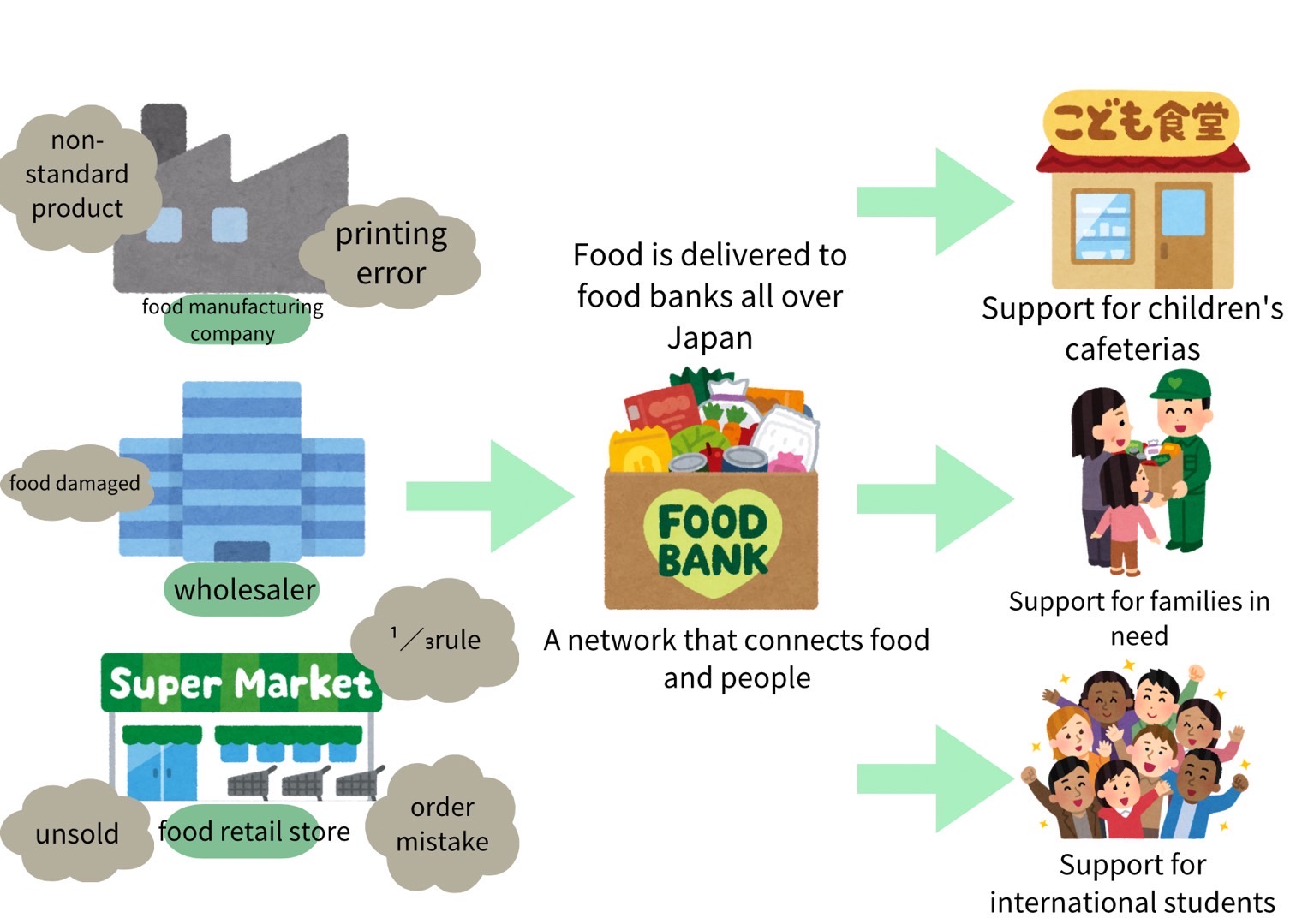
Food banks started in the United States in 1967.
Feeding America, America's largest food support organization, has 46 million supporters
The total number of food provided to needy households is 4.3 billion, and the amount of food loss is reduced by 158,000 tons.
The background to this achievement is the subsidy system, the provision of surplus agricultural and livestock products purchased by the Department of Agriculture, the law exempting food donors from liability (Bill Emerson Good Samaritan Food Donation Act),
Furthermore,there are tax incentives for donors.
On the other hand, the amount of food handled has not increased as much as the number of organizations has increased. They have not been able to respond to the increase in support needs accompanying the establishment of consultation desks (1313 institutions) and the increase in children's cafeterias (3718 places) under the support system for the needy. Food banks have not been able to respond to this increase, and are facing food shortages.
It is necessary to follow examples like Feeding America and promote cooperation between food banks and the government.

In order to promote food waste reduction, laws related to food waste have been established by the country.
The big difference between the Food Recycling Law and the Food Loss Reduction Promotion Law is the target.
The Food Recycling Law is a law for food-related businesses such as food manufacturers, wholesalers/retailers, and restaurants.
On the other hand, the Food Loss Reduction Promotion Act is a law that aims to work together
not only with businesses but with the entire nation.
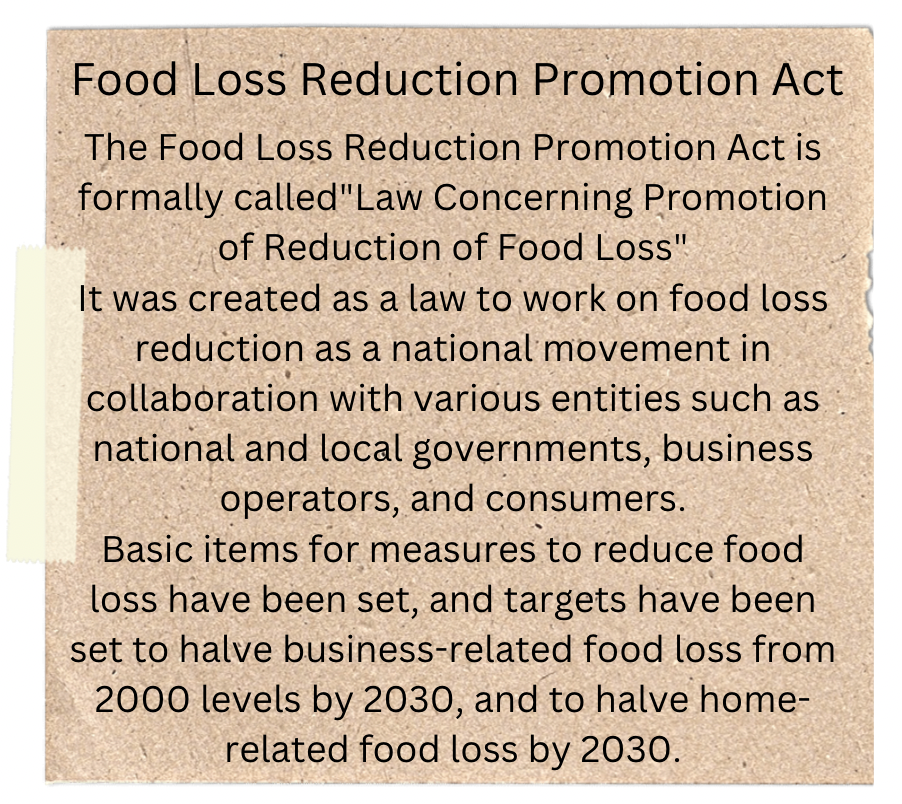
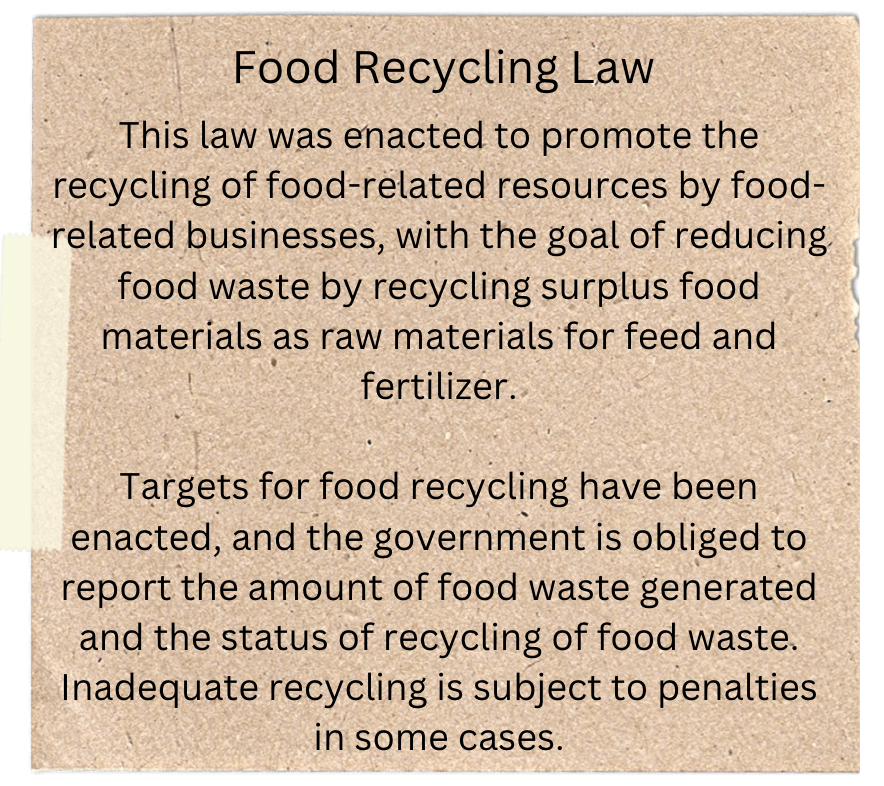
It is necessary to correctly understand the laws around us.


“Temaedori” is the act of actively choosing products that are nearing their sell-by date and are lined up in front of the shelves.
In October 2018, the city of Kobe started an awareness campaign in response to the problem of food waste caused by consumers picking up products with long expiration dates placed in the back of retail stores such as supermarkets. Then, this movement spread across the country.
This is expected to have the effect of reducing food waste due to food being discarded after the expiration date at retail stores.
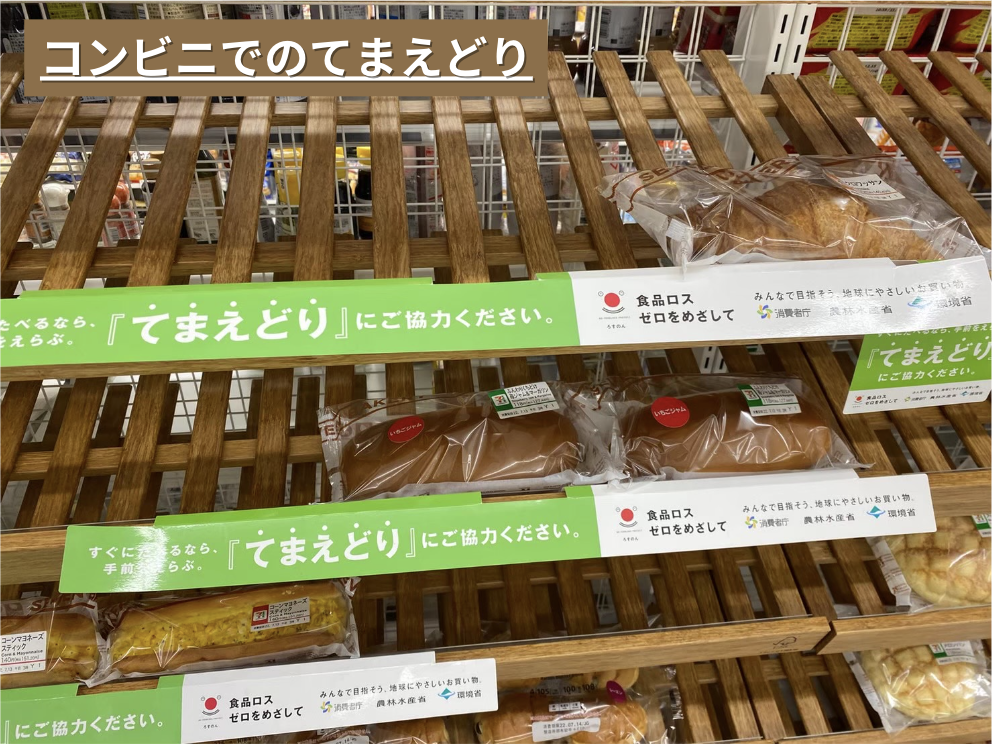
MAFF is working with the Japan Franchise Association, the Consumer Affairs Agency, and the Ministry of the Environment to create enlightenment materials in order to encourage consumers to demonstrate "temaedori" at retail stores.
In addition, anyone who is working to reduce food loss can freely use these enlightenment materials, and by doing so, they are working to widely promote the reduction of food loss.



In order to make consumers more aware of the need to reduce food loss and the activities that can be done to reduce food loss,
they have published educational leaflets summarizing the current state of food loss using specific figures, etc.
They are making pamphlets and other materials to inform consumers about
how much of an effect consumers can have by practicing this approach.
In addition, the Consumer Affairs Agency website collects and disseminates information, recipes for reducing food loss
through recipe posting sites, and promotes understanding of expiry dates to prevent early disposal.

Businesses handling food are being encouraged to review their business practices.
The Ministry of Agriculture, Forestry and Fisheries has set up a "Working Team for Reviewing Business Practices to Reduce Food Loss" to address issues such as excess inventory and returns that cause food loss in the manufacturing, wholesale, and retail industries.
1. Relaxation of delivery deadlines
Items that are not delivered within the short delivery deadline based on the "one-third rule" may be discarded.
Therefore, it is necessary to cooperate with retailers to ease delivery deadlines a reviewing the "one-third rule".
2. Comprehensive labelling of expiration dates
Currently, the expiration date of many products is indicated by the date displayed on package.
Items may not be delivered because the expiration date is earlier than the retailer's inventory,
and undeliverable items are more likely to be scrapped.
For this reason, by displaying the best-before date in a generalized manner,
such as by combining the expiration date with the year, month, or day
(with the date displayed, the date is unified in units of, for example, 10 days),
the reduction of food waste is attempted.
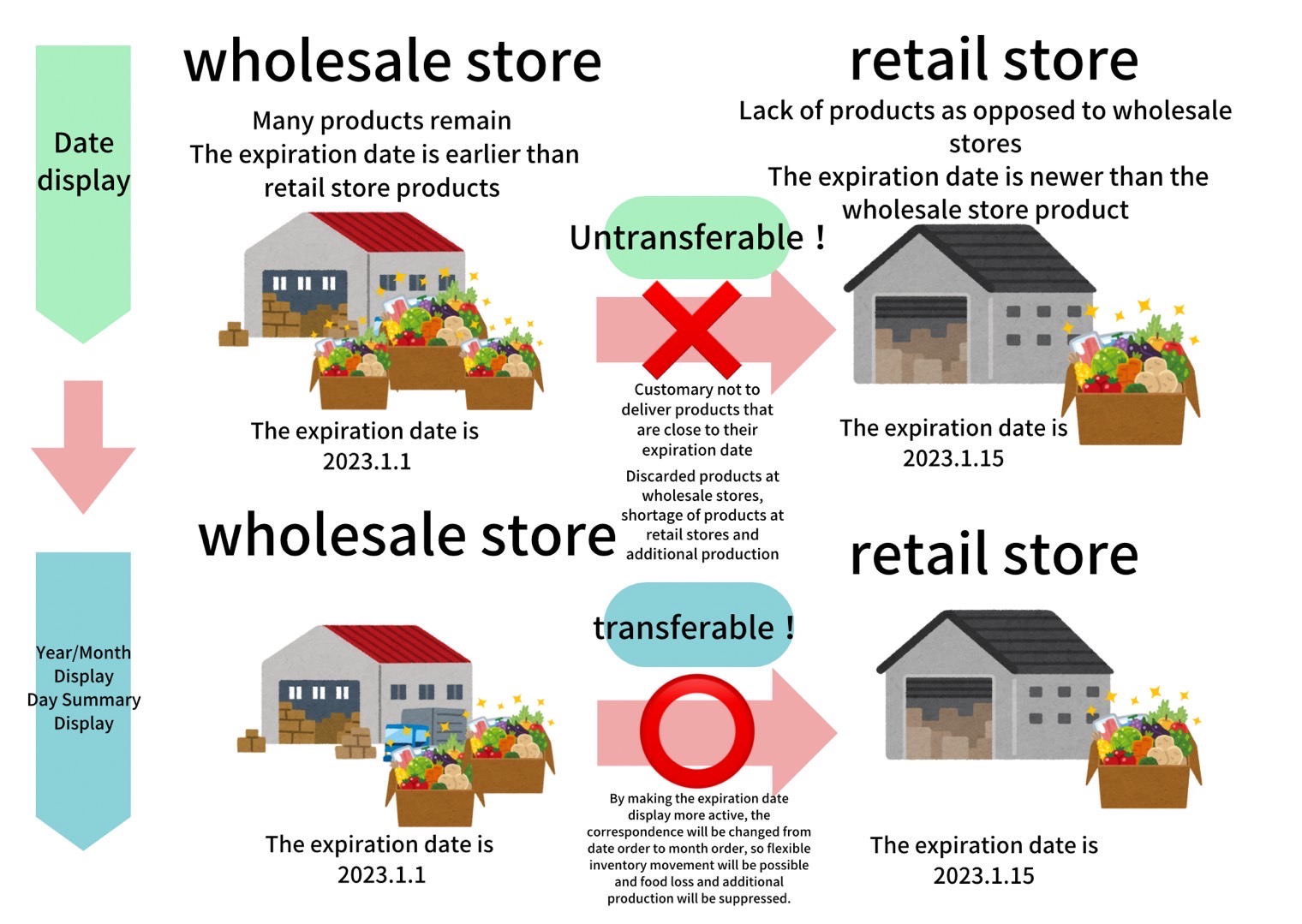
3. Review of sales methods at retail stores
It is often seen that retailers do not sell products until the expiry date/best before date and remove them from the sales floor before the expiry date.
Retailers are being asked to offer discounts on such expiring products, as many of the removed products will be discarded.
4. Review lead time (period from order to delivery)
In Japan, the period from order to delivery is short, and there is a strong demand not to run out of stock. For this reason, manufacturers are more likely to produce surplus products and discard them, and it is necessary to review the lead time.
At this stage, retailers are required to share the sales status with each supplier (manufacturer).

Until now, the supply chain was fragmented, so manufacturers, wholesalers, distributors, and retailers had to forecast demand independently, leading to mismatches in order quantities and food loss. Therefore, the Ministry of Economy, Trade and Industry and the Japan Weather Association have started a project to reduce waste in the supply chain by jointly making demand forecasts using big data such as weather information and POS data.

Bibliography :
・消費者庁 -「食品ロス削減関係参考資料」2019 (https://www.caa.go.jp/policies/policy/consumer_policy/information/food_loss/efforts/assets/efforts_210826_0001.pdf)
・一般社団法人全国フードバンク推進協議会 -「フードバンク活動の現状と課題」(https://www.caa.go.jp/policies/policy/consumer_education/meeting_materials/assets/review_meeting_002_191126_0014.pdf)
・ベネッセ -「食品ロス削減推進法の目的とは?政府が行っている取り組みもあわせて紹介」(https://benesse.jp/sdgs/article29.html)
・神戸市ホームページ -『神戸市発案の「てまえどり」が現代用語の基礎知識」選2022ユーキャン新語・流行語大賞を受賞しました!』(https://www.city.kobe.lg.jp/a04164/press/202212011903.html)
・環境省 -『「てまえどり」ダウンロードページ
』(https://www.env.go.jp/recycle/food/post_95.html)
・農林水産省 -「食品ロス削減に向けた商慣習見直しに取り組む事業者を募集します」(https://www.maff.go.jp/j/press/shokuhin/recycle/210820.html)
・富山県 -「食品ロス削減のための商慣習見直し事例集」(https://foodlosszero.jp/common/doc/p_pamphlet202111.pdf)
・日本気象協会 -「需要予測の精度向上・共有化による省エネ物流プロジェクト」(https://www.jma.go.jp/jma/kishou/minkan/ws160308/shiryou3.pdf)
・消費者庁ホームページ -「[食品ロス削減]食べもののムダをなくそうプロジェクト」(https://www.caa.go.jp/policies/policy/consumer_policy/information/food_loss/)
